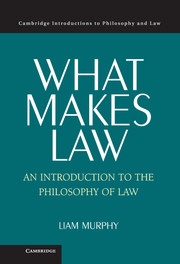7 - The Normative Force of Law
Published online by Cambridge University Press: 05 July 2014
Summary
In the previous chapter, I considered the possibility that the debate over the grounds of law is a waste of time, not because it is apparently intractable, though it is, but rather because it is about something that after all doesn’t matter. So long as we have theories of good governance (encompassing legitimacy, justice, and the rule of law), the ability to predict how individuals’ conduct will trigger reactions from legal institutions, and theories (one for each distinct kind of legal subject) of the prudential and moral relevance of legal materials, then we have no need for an account of how to determine the content of the law in force. Though this eliminativist view is not ridiculous on its face, in the end we should not accept it. People do accept the law, in Hart’s sense of treating it as a source of reasons for action, and different kinds of legal subjects (private subjects, officials of different kinds) most naturally explain the differences in the legal aspects of their practical situations in terms of their different standing with respect to the law – the different normative implications of the law for them and the different effects their decisions have on the development of the law. The distorting artificiality of trying to banish beliefs about the content of the law in force from practical deliberation is most clear when we consider the frame of mind of the lawmaker. Lawmakers do not think that they are creating legal materials that will have varying practical significance for people depending on their institutional role. They think that they are (justifiably) producing legal directives and power-conferring legal schemes that involve legitimate demands on our conduct. It is not clear that there is a coherent frame of mind available for lawmakers if they must stop thinking in this way.
- Type
- Chapter
- Information
- What Makes LawAn Introduction to the Philosophy of Law, pp. 109 - 143Publisher: Cambridge University PressPrint publication year: 2014



